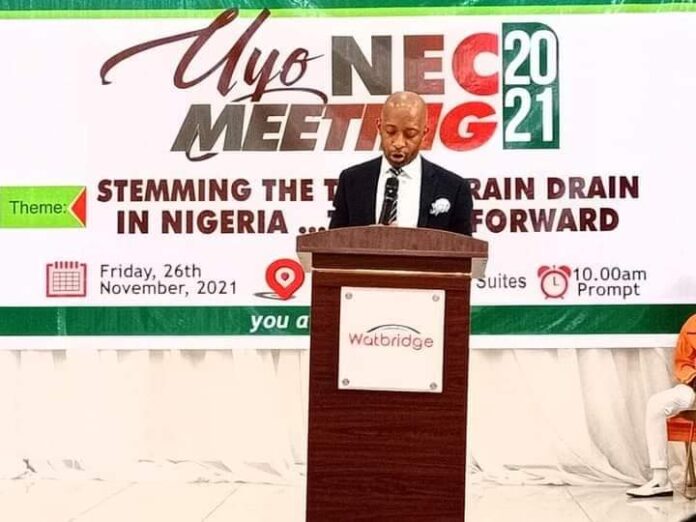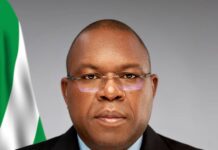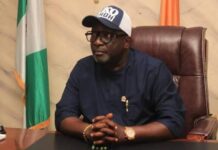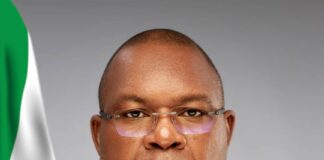Barr. Onofiok Luke, member representing Etinan federal constituency delivering a keynote at National Executive Committee (NEC) meeting of the National Association of Government General Medical and Dental Practitioners (NAGGMDP) in Uyo.
Itoro Bassey
To put a stop to ‘brain drain’ in the health sector, the Nigerian government has been advised to upgrade hospital facilities and equipment, provide more healthcare funding, emoluments and sufficient incentives for medical practitioners.
The government was also advised to invest meaningfully in primary healthcare by providing adequate power supply in the primary healthcare centres, security for personnel and facilities, as well as continuation of the training of medical officers.
These are some of the solutions given by the member representing Etinan/Nsit Ibom/Nsit Ubium federal constituency in the National Assembly, Barr. Onofiok Luke, as part of ways that would help in reducing the mass movement of Nigerian doctors to foreign countries.
Mr Luke said these while delivering a keynote address on the theme: “Stemming the Tide of Brain Drain in Nigeria, the Way Foward”, at the National Executive Committee (NEC) meeting of the National Association of Government General Medical and Dental Practitioners (NAGGMDP) in Uyo, on Friday.
The movement of skilled workers out of the country to foreign lands represents ‘brain gain’ for the countries that would enjoy their skills and experience, and ‘brain drain’ for Nigeria.
Nigerian doctors are said to have have been migrating to the United States of America, Canada, Saudi Arabia, the UK and many other nations across the world for greener pastures.
Luke, in his lecture at the event, quoted a report which stated that between 2015 and 2021, about 4,528 Nigerian trained doctors migrated to the United Kingdom.
READ : Indigenous construction companies in Akwa Ibom doing better under Governor Emmanuel – CEO Abaringo
He advised the government to gather data that would help it in understand the rational distribution of medical personnel, consumables and drugs.
“You cannot have a functional healthcare without statistics and planning, and without data. Data would make you understand the rational distribution of medical personnel, it would make you understand the rational distribution of consumables, and it would make you understand the rational distribution of drugs.
“As we begin to look at the next phase of leadership recruitment in the country and even in our state, one of the most important things we need to have is statistics. If we must invest in our healthcare, we must have statistics, and it is only the Health Management Information Systems that can give us this”.
According to Luke, not only has the migration of health professionals had adverse effect on the already challenged health system in the country, but it has also created a great challenge for the public health system which has further widened the health inequalities gap.
He advocated for the creation of special hospitals that would be responsible for overseeing the mental health of doctors, and for carrying out comprehensive checks and treatment of doctors.
“Our healthcare system is our most vital resource, as our first motivation to be or do anything else is a good health. These can only be achieved through infrastructural development, enactment of relevant laws for the sector, and experience and robust public health system peopled by some of the best personnel in the world.
“Over the years, we have built infrastructure in this state. And so, the way out for this state, as we go forward, is human capacity development. You cannot speak about the capacity of an individual if you don’t speak about the people’s healthcare.
“You cannot have a productive economy if you don’t have a healthy population. And so, the beginning of human capacity development is healthcare.
“To check brain drain therefore, we must ensure the training of our medical officers to becoming registrars to senior registrars, and then to consultants. That we can make happen in the university teaching hospital.
“We thank His Excellency the Governor for his massive investment in the health sector in this state, and for making effort to establish the State University Teaching Hospital where the government can have absolute control under the Residency Programme for the training of our people to becoming consultant so that they can specialize in different fields.
“With these, I believe that we would be able to check the brain drain from the state and in the country. And any medical officer who has devoted his time and energy to serve us should not be vilified.
“We should appreciate their efforts. If we in the political class can be awarded for what we do in the political field, then we need to appreciate the medical doctors by awarding them, not only by plaque but by giving them something meaningful”, he said.
RELATED STORY : Onofiok Luke: His thoughts for tomorrow
Earlier in his opening address, the Chairman on the occasion, Mr. Akan Udofia, said more attention should rather be paid on curbing the trend of health experts leaving the country by providing conducive and improved work conditions for them.
Udofia noted that brain drain decreases Nigeria’s Gross Domestic Product (GDP) while it increases those of the foreign nations where professionals migrate to.
He added that private players should be brought in to invest in the health sector, saying that tackling of brain brain could be seen in Governor Udom Emmanuel’s intervention in healthcare during the Covid19 period which, according to him, was the best in the country.
At the occasion, Governor Udom Emmanuel was represented by Pastor Umo Eno, the state Commissioner for Lands. The meeting also played host to national and state officers of NAGGMDP, Nigeria Medical Association (NMA), Akwa Ibom Commissioner for Health, Prof Augustine Umoh, and his counterpart in the Information and Strategy Ministry, Cmrd. Ini Ememobong, among others.
















